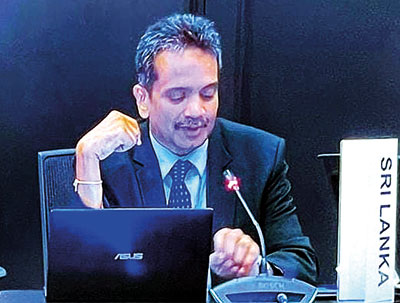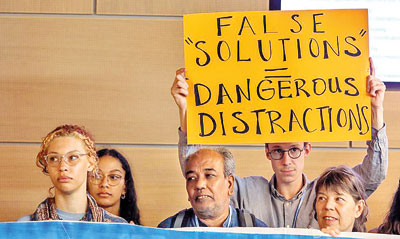News
Not much visibility yet on climate financing
View(s):By Tharushi Weerasinghe
The Bonn Climate Change Conference 2023 which initially dragged its feet on decisions due to stalemates on logistics like timing sprinted to a close at 11:40 pm on Thursday night with many questions left disappointingly unanswered.
The subsidiary bodies of the United Nations Framework Convention on Climate Change meet twice a year in the lead-up to the Conference of Parties every year.

Prof Buddhi Marambe
The issue of loss and damage, one of COP27’s triumphs last year, is still very much in the grey areas of the operational modalities. Despite two party meetings having been held so far, the operational modalities of the climate financing for developing countries who deal with the negative and inevitable impacts of climate change, are undecided.
“Since general negotiation processes could not be completed there was no text, so the 59th session of the subsidiary bodies and the continuation of the discussion was pushed to COP28,” noted Prof. Buddhi Marambe, Party Member of the Sri Lankan delegation at Bonn this year.
Prior to Bonn, parties were requested to make submissions this February on the loss and damage agenda.
“A transitional committee of 24 members, 10 from developed countries and 14 from developing countries, was appointed by the UNFCCC based on the decision at COP27 in Sharm-el-Sheikh last year,” noted Prof. Marambe adding that the committee was scheduled to meet thrice before the next Conference of Parties in Dubai this year.
Two of these meetings, intended to finalise the operationalisation of the loss and damage fund have already taken place but discussions have again been limited to logistics with the report of the second meeting still unreleased. The 58th sessions of the subsidiary bodies that just happened in Bonn saw the second Glasgow Dialogue on loss and damage with expectations running high – but stakeholders noted that it fell disappointingly flat, with the Loss and Damage Collaboration calling it a “Glasgow Monologues” as parties and groups read existing, and far apart statements.
Civil society, the only voices with no corporate or government interests, was not given much room in the discussions either.
Sri Lanka’s focus areas at the climate discussion on loss and damage, in light of the severe food insecurity the country is facing right now, are food systems, climate-smart agriculture, and the use of artificial intelligence in agriculture, according to Prof. Marambe. While these interests aren’t on any official texts yet, they will be pursued by Sri Lankan delegates as future interests at upcoming climate interventions.
G77 and China, the bloc that lead the loss and damage lobby at COP27, have formed a committee to address how food security and agriculture can be considered in loss and damage discussions. The lead coordinator of this bloc has appointed another committee for this subset of discussions and Prof. Marambe is a part of it. “Most discussions from this committee have been left over for COP28 too, Prof. Marambe told the Sunday Times.

Civil Society Action at the Bonn Climate Conference. Pix courtesy Earth Negotiations Bulletin - International Institute for Sustainable Development
While no official decisions have been arrived at where the loss and damage fund is concerned, sources that wished to remain anonymous told the Sunday Times that some focuses had been established during certain “corridor talks”.
“Talks seemed to gear towards emergency funds mostly, as opposed to funds for long-term onset issues,” the source noted adding that parties seemed to be zeroing in on a niche — the water sector. But most questions even on that remain unanswered since the niche term “water” is still a very broad way to identify natural consequences of climate change which the fund is supposed to be used for. “Whether or not recovery is being considered has also come up in the corridor talks.”
The issue of climate finance for mitigation and adaptation has been a sticking point in climate negotiations for decades now. Parties at COP27 were still appealing for developed countries to pull through on financial commitments they made to the developing world as far back as 2009.
Many developing countries at Bonn this year held that developed countries should not only allow climate finance discussions to actually happen but also be prepared to scale up measures for implementation.
Disasters like the devastating floods in Pakistan last year drove the urgency for sound fund distribution systems that transfer resources from developed countries, countries that developed at irreversible costs to the climate and environment over the centuries, to developing countries, the countries that have not enjoyed the bounties of climate destruction but are paying the price for it.
Visions on the operationalisation of the fund differed since developed countries continued to identify the fund with the roles of the World Bank, and the G7 and V20 Group’s Global Shield. This was problematic since two were programmes outside the UNFCCC and its principles like polluter pays, and equity. Developed countries also pushed for the Santiago Network for Loss and Damage and Global Shield to play the coordinating roles of the loss and damage funding arrangements but developing countries opposed this since the Santiago Network was only mandated for technical assistance.
The best way to say that you found the home of your dreams is by finding it on Hitad.lk. We have listings for apartments for sale or rent in Sri Lanka, no matter what locale you're looking for! Whether you live in Colombo, Galle, Kandy, Matara, Jaffna and more - we've got them all!

